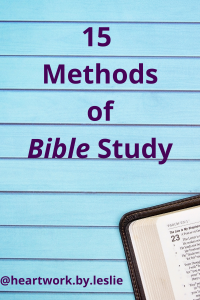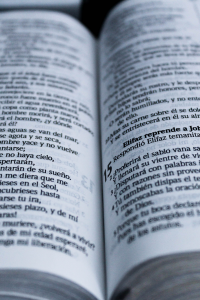This post may contain affiliate links, which means we may receive a commission, at no extra cost to you, if you make a purchase through a link. Please see our full disclosure on the Affiliate Disclosure Page.

As Christians, we know that Bible study is very important for us. Growing up in church, I was taught that BIBLE stands for Basic Instructions Before Leaving Earth.
It is so true in many ways. We should follow the instructions and commands given to us through the Word of God.
Why Should We Study the Bible?
God is the living word. We know this. Reading the Bible helps us to draw closer to God. Studying the word allows us to apply the scriptures to our life.
How Should We Study the Bible?
 First, pray for understanding before reading.
First, pray for understanding before reading.
Second, write down any phrases or words that you don’t understand during your reading.
Third, use resources.
Fourth, gather your supplies.
Fifth, check out some Bible Study Tips.
Sixth, read, study, and learn what God wants you to know.
What Supplies Should We Use to Study the Bible?
Grab a good study Bible.
You’ll need some pens/pencils and a journal.
Some highlighters will be great for you as well.
Finally, you will want a really good Bible commentary.
What Type of Bible Should We Use to Study?
 There are a few types of translations of the Bible.
There are a few types of translations of the Bible.
Word-for-Word Translations
These translations of the Bible are literally what they sound like. The people who translated them did their best to go word-for-word from the original Hebrew and/or Greek.
The closest word-for-word versions of the Bible are the King James Version, the English Standard Version, and the New Revised Standard Version.
Thought-for-Thought Translations
These versions of the Bible are usually thought to have been translated for meaning. Each thought in the Bible is translated into English as the meaning of the thought.
The best options for this type of translation are the New International Version and the New Living Translation.
Paraphrased Translation
Right now, there is one main option for this version of the Bible. It is The Message Bible. Instead of translating by word or thought, the scriptures are paraphrased.
What are Some Methods for Bible Study?
There are several ways to study the Bible. Some of them are simple and do not require a lot of work. Those ways do not take much time to complete either.
However, some ways are very intense and take more time each for daily studying.
Bible Journaling
 The first method is journaling. You can read about that in my post about Bible journaling. I would suggest getting a journaling Bible that you like. I have this one, and so far, I am enjoying it.
The first method is journaling. You can read about that in my post about Bible journaling. I would suggest getting a journaling Bible that you like. I have this one, and so far, I am enjoying it.
Also, look at the supplies section above so that you can get pens and highlighters that do not bleed through the pages.
Coloring the Scripture
There are bibles that have certain scriptures illustrated. These are verses that are important. The reader can color these while reading and studying. It will help these verses stick in his/her memory. One of these is the Beautiful Word Coloring Bible.
Write the Scripture
You can write scriptures that stick out to you during the reading and studying in a journal or notebook. You can also write them in the margins of your journaling Bible.
Bible Study for Beginners
If you need a little help to focus on your study, grab a Bible study. You can get one from The Daily Grace Co. That is where I got my current study From Eden to Eternity, and so far, I’m loving it.
Listen to the Scriptures
 If you have a hard time reading the Bible. You can listen to it here on Amazon or on the YouVersion Bible app.
If you have a hard time reading the Bible. You can listen to it here on Amazon or on the YouVersion Bible app.
Word Study
 Another method of Bible study is to do a word study. In a word study, you write the word that stood out or that you don’t understand in your journal. Read the entire passage around that word 2-3 times. Write the scripture(s) where the verse is found in your journal.
Another method of Bible study is to do a word study. In a word study, you write the word that stood out or that you don’t understand in your journal. Read the entire passage around that word 2-3 times. Write the scripture(s) where the verse is found in your journal.
Use a Bible lexicon (a type of dictionary that goes back to the original language) to trace the word back to Hebrew or Greek.
Locate the word throughout scripture. Be sure that it is the same original word.
Summarize your findings in your own words. Apply what you learned to your life.
Topical Study
 A topical study is similar to a word study, but in this method of Bible study, you will trace a topic through the Bible.
A topical study is similar to a word study, but in this method of Bible study, you will trace a topic through the Bible.
Use a concordance, dictionary, lexicon, or Bible index. Find a topic like love, forgiveness, peace, redemption, or Jesus.
When you have found a topic, write down the verses where the topic is discussed. Read each of the verses in 2-3 translations.
Write in your journal what you have learned about the topic. Apply it to your life.
This is a great idea to do no matter if you have chosen one of the other methods of Bible study.
Chapter Study
 When you study a chapter of the Bible, it could be part of a larger study or a stand-alone. This could be incorporated into any of the other methods of Bible study.
When you study a chapter of the Bible, it could be part of a larger study or a stand-alone. This could be incorporated into any of the other methods of Bible study.
Find the chapter you wish to study. Read the chapter at least 5 times. Read it once or twice in other translations as well.
Identify key elements of the text. Is there a descriptive title? What are the key verses and keywords? Write down the main points. Do you have questions, problems, or concerns about the chapter? Put those in your journal as well.
Read any cross-references that are listed in your study Bible. As you follow through these, determine the central message of the chapter and the connected verses.
Verse Mapping
Verse mapping is an illustrated version of a word study, in a way. You will select a verse or passage and read it in different translations.  When you have completed that, write down the verse/passage in your journal.
When you have completed that, write down the verse/passage in your journal.
Put it in the middle of the page and draw a circle around it. Do you remember the bubble maps from middle school? If so, the end product will look similar.
Highlight each of the important words in the verse using a different colored highlighter. Draw bubbles around the verse bubble. Highlight each of these in a color to match the important words you chose.
In each of the outer bubbles, define the word. Try to go back to the original language, if possible. Study the words and meanings to see how they connect to give the scripture more emphasis.
On the bottom of the page or the next page of the journal, write out how the verse/passage personally applies to your life.
I have not tried this yet, but it is one of the methods of Bible study I plan to include in my studying soon.
Acronyms for Methods of Bible Study
READ
Read
Examine
Apply
Pray
Read the text. Examine the who, what, where, when, why, and how of the scripture. Apply the scripture to your own life. Pray for God to show you how He wants the scripture to connect to you and your situation.
 SOAP
SOAP
Scripture
Observation
Application
Pray
Pick a scripture. Observe what God is saying to you. Apply the scripture to your life. Pray for guidance and understanding.
REST
Read
Engage
Savor
Take Charge
Read the scripture. Engage with it, and write things down. Savor the scripture within your situation. Take Charge and do what God has commanded in the passage.
POWER
Prayer
Observe
Write
Envision
Response
Pray for understanding. Observe the important things in the passage. Write down key points and things you don’t understand. Envision what God has for you from the scripture. Respond to how this applies to your life.
 APPLE
APPLE
Attributes of God
Promises of God
Principles of Life
Lessons Learned
Example to Follow
This one is a little different from the other methods of Bible study, but you can use it to determine more about God. When you write out each of the things in APPLE, it will help you to draw attention to the most important parts and meaning of the passage.
WORD
Word of God
Observations
Reflect
Devotions
Write down your favorite scriptures from the passage you read. After that, you can write down what sticks out. Summarize what you read or outline it in a way that you can understand it. Reflect on the passage and apply it to your life. Finally, take the time to write down your prayer about how to apply this passage to your life. What do you think you should tell God after reading the scriptures?
Conclusion
Studying the Bible is extremely important to spiritual growth. These are just a few methods of Bible study that can help you to delve deeper into the passages of scripture you are reading.
Have you used other methods of Bible study? If so, share it in the comments. I would love to see other methods and possibly try them one day.
